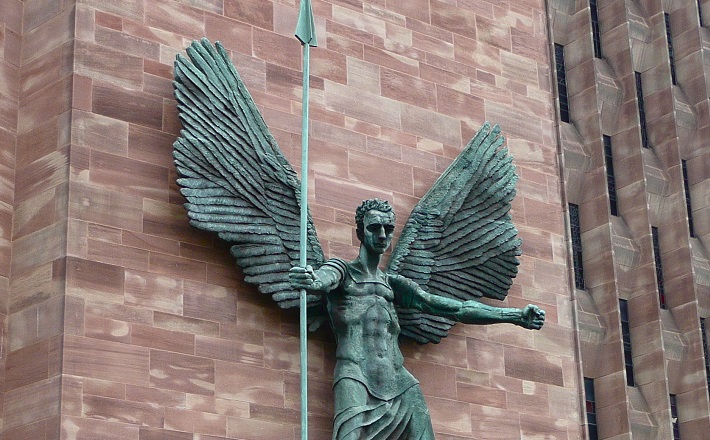Commentary on Daniel 12:1-3
Following stories of trial and contest, the book of Daniel culminates in a series of apocalyptic visions in which the book’s hero, Daniel, is shown his people’s future.
In Daniel 7:27, his people are given a special name: “the People of the Holy Ones of the Most High.” This name marks the special relationship among Daniel’s people, the Most High God, and other inhabitants of heaven, who in Daniel are variously called angels, watchers, princes, men, and holy ones.
“Michael, your prince”
Daniel 12 is part of a longer discourse that begins in chapter 10. A “man,” or angel, dressed in linen, with a face like lightning and eyes like flaming torches (10:5), speaks with Daniel, touches him, and gives him strength to stand (10:10-11,16-19). This angel, also called “one in human form,” explains to Daniel that he has been fighting against the “Prince of Persia” and will later fight the “Prince of Greece” (10:13, 20-21). Alongside him fights Michael, “one of the chief princes” (10:13). The angel who speaks with Daniel tells him, “There is no one who contends with me against these princes except Michael, your prince” (10:21).
This passage provides important background for Daniel 12:1. The title “prince” in Daniel 10 and 12 refers to a superhuman, celestial being who represents and has responsibility to protect a particular people (cf. Deuteronomy 32:8-9. LXX and 4QDeutj). The identification of Michael as the prince of Daniel’s people suggests that Michael has been their guardian from the very beginning of their existence. It emphasizes to Daniel and his audience that when they do not have power to contend against their enemies, the greatest of all princes fights on their behalf. A situation may seem hopeless, but what Daniel’s oppressed people can see and hear does not tell the whole story. Behind the scenes, forces more powerful than those on earth shape the destinies of peoples and nations.
“In that time”
Up to this point, Daniel’s visions have portrayed a succession of warring empires who subjugate God’s people, century after century. Toward the end of each vision Daniel sees a king, sometimes symbolically portrayed as a horn, whose pride reaches to the heights of heaven and whose lies lead many among the Judeans to forsake their covenant with God. This king desecrates the sanctuary, proscribes Judaism, and forces people of Judea to worship a foreign god. In later Christian interpretation he becomes identified with the Antichrist. For the earliest audience of Daniel, he was the Seleukid king Antiochus IV Epiphanes (d. 164 BCE).
The angel who speaks to Daniel reveals that this proud king, persecutor of Daniel’s people, will meet his end “with no one to help him” (Daniel 11:45). Daniel 12:1 follows immediately on this prediction. In this verse, the phrase “in that time” is repeated three times, identifying this moment as a decisive turning point. In that time of horrible persecution and of the persecutor’s death, Michael, warrior-angel and prince of Daniel’s people, will stand up. The people will be delivered, all who are “written in the book” (12:1). To be written in this book is to be registered as a citizen, not of an earthly city, but of God’s kingdom. This people will experience distress like nothing ever before known. “That time” of greatest anguish will be the moment of their salvation.
Waking from dusty earth
The next verse promises resurrection for some of those who have died (Daniel 12:2). Two fates await those who wake from dusty earth. One group will wake to life eternal. Another group will wake to reproaches and eternal horror. This word “horror” or “abhorrence” occurs only one other time in the Old Testament, in the final verse of the book of Isaiah (Isaiah 66:24). The scroll of Isaiah culminates in a vision of new heavens and new earth, a promise that God’s people will endure forever, and a final warning: those who come to worship the Lord will see the corpses of the ones who have rebelled against God. Of these rebels God says, “their worm shall not die, their fire shall not be quenched, and they shall be an abhorrence to all flesh” (Isaiah 66:24). In both passages, God’s radical intervention does not erase the legacy of those who rebel against God, but offers them as an eternal sign.
Among those who wake to eternal life, another group is singled out: “those who are wise,” who have “made many righteous” (Daniel 12:3). The angel told Daniel of these “wise” ones in 11:33-35. In the midst of persecution they will give their lives in nonviolent witness to God’s revelation. They are teachers and martyrs. By their courage and truth they will help others to remain faithful to the covenant. Their reward will be to shine like the stars of the firmament. These wise teachers will counter eternal reproach with eternal witness to the light of truth.
Preaching
When you preach this passage, help your congregation to know that the Prince of your people is fighting for them, standing over them, and working for their salvation in ways that they cannot see. Ask them to consider what it means for them to be the people of the holy ones of the Most High, to share citizenship in the kingdom of God with the holy angels. Our shared hope in life eternal, with God and angels, is not simply a dream for the future. Daniel offers us this hope to sustain, guide, strengthen, and embolden us. Teach your people to witness to God’s covenant by their words and by their lives. Show them a path of nonviolent resistance to persecution and give them strength to stand up for righteousness in the face of oppression and death. Caution them not to look away from the legacy of sin, violence, and rebellion. And invite them to look to the lives of the martyrs and saints for the light of truth that will guide them in their hour of distress.


November 15, 2015